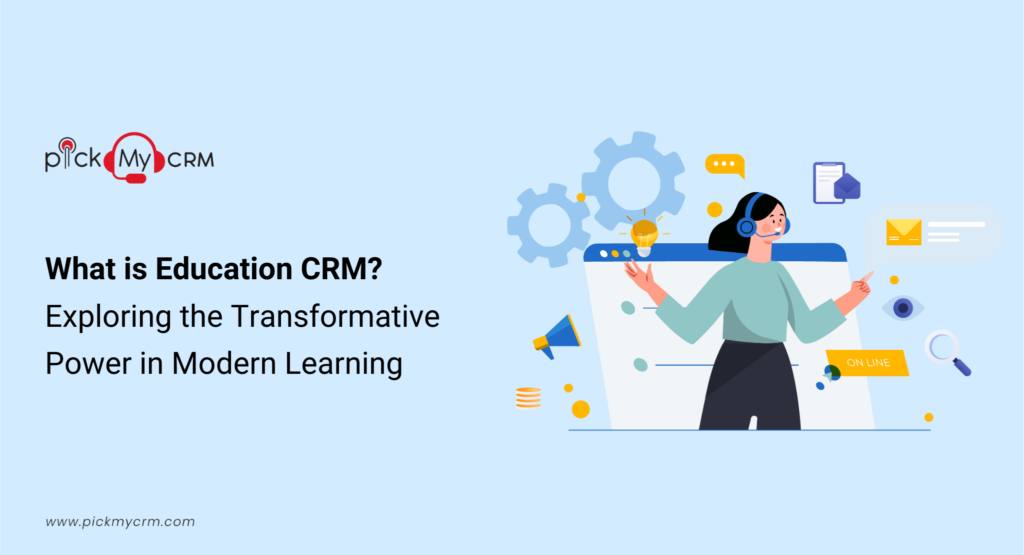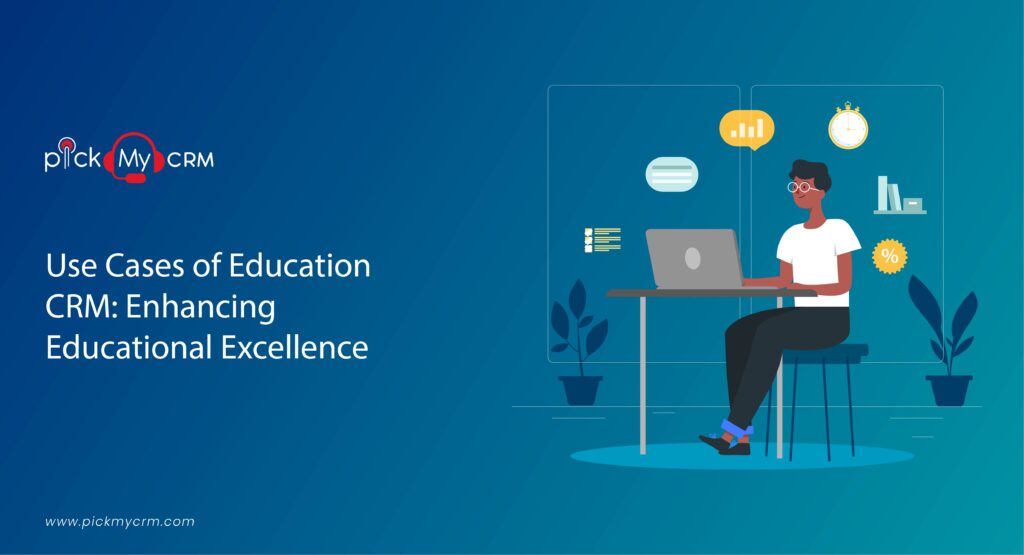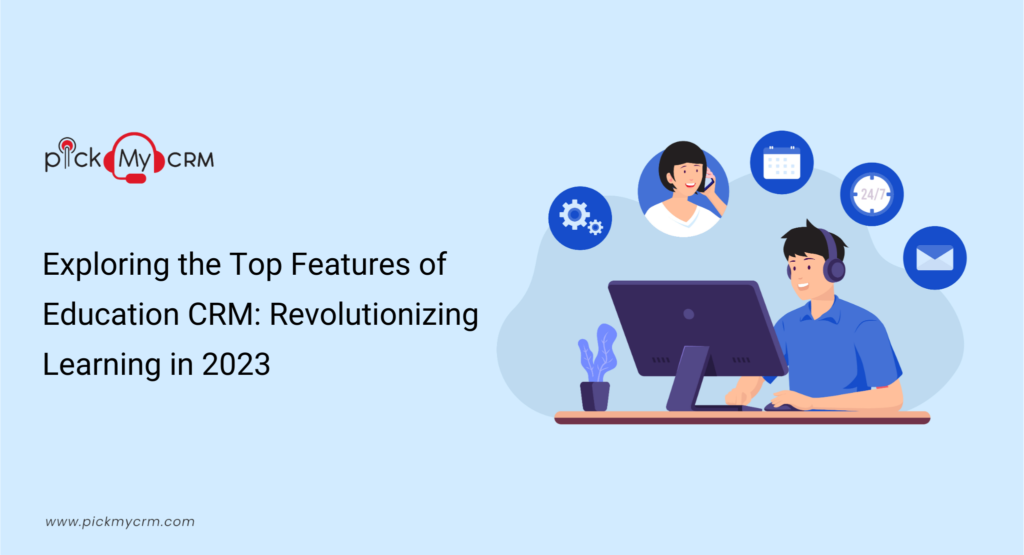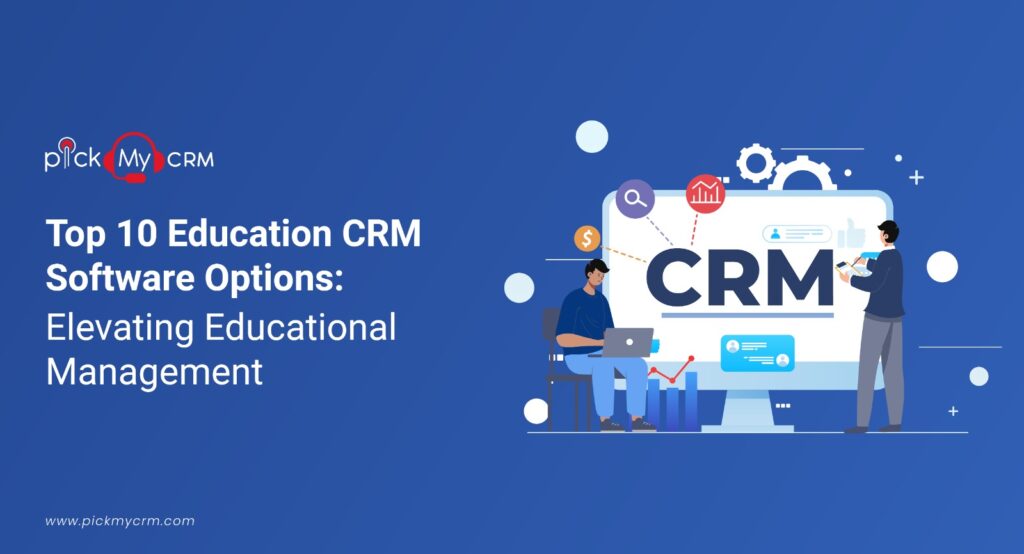What is Education CRM? Exploring the Transformative Power in Modern Learning
What is Education CRM?
CRM for education is the strategic adoption of Customer Relationship Management technology within educational institutions to enhance student interactions, administrative processes, and academic outcomes. By harnessing data-driven insights and automation, CRM revolutionizes the connection between educators and students, facilitating personalized support and well-informed decision-making.Why Education CRM?
CRM for education revolutionizes the learning landscape by tailoring engagement to individual students' needs, enhancing administrative efficiency, and enabling data-driven decision-making. Personalized interactions based on student preferences and performance foster a sense of belonging and drive retention. Streamlining administrative processes through automation optimizes resource allocation and reduces errors. Proactive student support using predictive analytics identifies challenges early, leading to timely interventions. Furthermore, CRM fosters improved communication among stakeholders and cultivates a thriving Alumni network, enriching the comprehensive educational experience.When and Where to Implement Education CRM?
The opportune moment to integrate CRM is now, as it directly tackles the pressing issues of the contemporary education sphere. CRM's applicability spans from K-12 schools to higher education establishments, effectively catering to the entire educational spectrum. Whether in traditional classrooms or virtual learning platforms, CRM effortlessly adapts to diverse environments.How CRM Transforms Education
CRM empowers educators and administrators to,- Personalize Engagement: Tailor communications and support based on student preferences and behaviors.
- Automate Administrative Tasks: Streamline admissions, enrollment, and other administrative processes for heightened efficiency.
- Predict Student Success: Leverage data analytics to identify at-risk students and provide timely interventions.
- Enhance Alumni Relations: Foster lifelong relationships and networking opportunities with Alumni.
Who Benefits from Education CRM?
All stakeholders in the educational ecosystem benefit from CRM,- Educators: Deliver targeted support and personalized learning paths.
- Students: Receive tailored assistance, resources, and communication.
- Administrators: Streamline operations, optimize resource allocation, and make data-driven decisions.
- Parents: Stay informed about their child's progress and institution-wide updates.
- Enhanced Student Engagement: Personalized interactions based on data improve engagement and relevance.
- Improved Retention Rates: Tailored support and engagement lead to higher student retention.
- Streamlined Administrative Tasks: Automated processes like admissions and registrations save time and reduce errors.
- Proactive Student Support: Predictive analytics identify at-risk students for timely interventions.
- Data-Informed Decision-Making: Holistic student data aids in making strategic, data-driven choices.
- Strengthened Alumni Relations: CRM nurtures lifelong connections with Alumni through ongoing engagement.
- Enhanced Communication: Targeted and automated messages reach students, parents, and Alumni.
- Stakeholder Collaboration: CRM fosters alignment among faculty, staff, and administrators.
- Personalized Learning Paths: Insights enable educators to create tailored learning experiences.
- Scalability and Adaptability: CRM systems suit institutions of all sizes, from K-12 to universities.
Key Features of Education CRM: Empowering Institutions for Success
Customer Relationship Management (CRM) systems tailored for education offer a comprehensive Range of Features that empower institutions to elevate their engagement, streamline operations, and enhance student outcomes. Let's explore the essential Features of Education CRM,- 360-Degree Student View: Comprehensive student profiles for personalized interactions.
- Communication Management: Automated messaging and tailored communication.
- Predictive Analytics: Early identification of at-risk students for intervention.
- Task Automation: Streamlined administrative processes and workflows.
- Alumni Management: Building and maintaining strong Alumni relationships.
- Reporting and Analytics: Utilizing data-driven insights to facilitate informed decision-making.
- Integration Capabilities: Seamless data flow with other systems.
- Event Management: Organizing and overseeing educational events.
- Personalized Learning Paths: Tailored learning experiences for each student.
- Mobile Accessibility: Accessing features conveniently on mobile devices.
- Security and Data Privacy: Safeguarding confidential information to maintain integrity.
- Customization and Scalability: Adapting to institution-specific needs and growth.
- Engagement Analytics: Monitoring and enhancing student engagement.
- Social Media Integration: Engaging students and alumni on familiar platforms.
- Workflow Automation: Automating routine tasks for increased efficiency.
Types of Education CRM: Tailoring Solutions for Diverse Needs
CRM solutions customized for the education sector are available in a range of types, each meticulously crafted to address the needs and goals of educational institutions. Let's explore the different types of CRM tailored to the unique requirements of the education sector,- Admissions CRM: Streamlining Enrollment Processes
- Student Engagement CRM: Elevating Student Interactions
- Alumni Relations CRM: Nurturing Lifelong Connections
- Academic CRM: Enhancing Teaching and Learning
- Administrative CRM: Optimizing Operational Efficiency
- Fundraising and Development CRM: Supporting Financial Growth
- Communications CRM: Prioritizing Effective Communication
- Learning Management System (LMS) Integration: Creating a Comprehensive Ecosystem
- Outreach and Recruitment CRM: Focusing on Student Recruitment
- Student Success CRM: Ensuring Academic Excellence
- Mobile CRM: Enabling On-the-Go Accessibility
- Cloud-based CRM: Scaling Effortlessly in the Cloud
- Analytics-focused CRM: Harnessing Data for Informed Decisions
- Community Engagement CRM: Building a Strong Educational Community
- Customizable CRM: Adapting to Unique Institution Needs
Top 5 Education CRM
Salesforce for Education
Overview: Salesforce is a leading CRM provider that offers a tailored solution for educational institutions. It covers admissions, student engagement, fundraising, Alumni relations, and more. Features and Benefits- Configurable student profiles
- Automated communication
- Predictive analytics for student achievement
- Event administration
- Alumni Involvement
- Seamless integration features.
HubSpot for Education
Overview: HubSpot offers a CRM solution with tools for inbound marketing, customer service, and communication. It's known for its user-friendly interface. Features and Benefits: Contact management, email marketing, automation, lead tracking, a ticketing system for customer support, and integrated communication tools. Pricing: HubSpot offers free and paid plans. The Education plan is free and includes many features suitable for educational institutions. Enhanced packages, offering supplementary functionalities, can vary in pricing from $50 to $3,200 per month.Blackbaud CRM
Overview: Blackbaud CRM focuses on providing solutions for nonprofits and education. It supports admissions, fundraising, event management, and Alumni relations. Features and Benefits- Constituent management
- Donor relations
- Fundraising campaigns
- Event management
- Communication tracking
- Alumni Engagement tools.
Ellucian CRM
Overview: Ellucian CRM is designed specifically for higher education institutions. It assists with student recruitment, enrollment management, academic advising, and Alumni engagement. Features and Benefits- Student recruitment tools
- Enrollment management
- Academic advising features
- Alumni Engagement
- Integration with other Ellucian products.
Technolutions Slate
Overview: Higher education institutions utilize Technolutions Slate to manage and streamline their admissions and enrollment processes. It offers tools for managing applications, communications, events, and data analytics. Features and Benefits- Application management
- Communication automation
- Event planning, data analytics
- Student recruitment tools.




